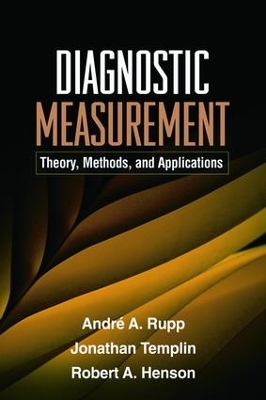
Diagnostic Measurement
Guilford Publications (Verlag)
9781606235270 (ISBN)
- Titel ist leider vergriffen;
keine Neuauflage - Artikel merken
Winner--Award for Significant Contribution to Educational Measurement and Research Methodology, AERA Division D
André A. Rupp is Assistant Professor in the Department of Measurement, Statistics, and Evaluation at the University of Maryland. Dr. Rupp’s current research centers on developing methodological frameworks and modeling approaches that support rigorous interdisciplinary exchange between measurement specialists, substantive researchers, and applied practitioners. Two promising research areas in which he is intimately involved are diagnostic classification models (DCMs), which are the focus of this book, and modern measurement approaches for innovative digital learning environments. Jonathan Templin is Professor and E. F. Lindquist Chair in the Department of Psychological and Quantitative Foundations at the University of Iowa. His research focuses on diagnostic classification models--psychometric models that seek to provide multiple actionable and reliable scores from educational and psychological assessments. He also studies Bayesian statistics, as applied in psychometrics, broadly. Dr. Templin is an elected member of the Society of Multivariate Behavioral Psychology. He received the Outstanding Contribution to Research in Cognition and Assessment Award from the Cognition and Assessment Special Interest Group of the American Educational Research Association, as well as the inaugural Robert L. Linn Memorial Lecture Award from the University of Colorado Boulder and the University of California, Los Angeles. Robert A. Henson is Assistant Professor in the Department of Educational Research Methodology at the University of North Carolina at Greensboro. His major research interests have focused on DCMs, with a primary focus on developing concepts and procedures for DCMs that are analogous to common concepts and procedures of more traditional measurement techniques. Dr. Henson’s hope is that, by expanding concepts that are already familiar in other settings, DCMs will be developed using a common methodology for assessments that will provide fine-grained information. Additional interests include latent-variable models in general and mixed linear models.
Index of Notation
1. Introduction
I. Theory: Principles of Diagnostic Measurement with DCMs
2. Implementation, Design, and Validation of Diagnostic Assessments
3. Diagnostic Decision Making with DCMs
4. Attribute Specification for DCMs
II. Methods: Psychometric Foundations of DCMs
5. The Statistical Nature of DCMs
6. The Statistical Structure of Core DCMs
7. The LCDM Framework
8. Modeling the Attribute Space in DCMs
III. Applications: Utilizing DCMs in Practice
9. Estimating DCMs Using Mplus
10. Respondent Parameter Estimation in DCMs
11. Item Parameter Estimation in DCMs
12. Evaluating the Model Fit of DCMs
13. Item Discrimination Indices for DCMs
14. Accommodating Complex Sampling Designs in DCMs
Glossary
| Erscheint lt. Verlag | 21.5.2010 |
|---|---|
| Reihe/Serie | Methodology in the Social Sciences |
| Verlagsort | New York |
| Sprache | englisch |
| Maße | 178 x 254 mm |
| Gewicht | 654 g |
| Themenwelt | Geisteswissenschaften ► Psychologie ► Test in der Psychologie |
| ISBN-13 | 9781606235270 / 9781606235270 |
| Zustand | Neuware |
| Informationen gemäß Produktsicherheitsverordnung (GPSR) | |
| Haben Sie eine Frage zum Produkt? |
aus dem Bereich


